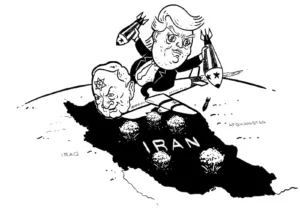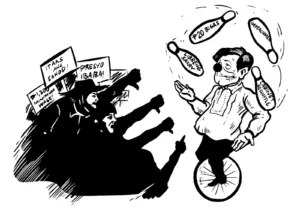Message to the New People's Army from the Central Committee, Communist Party of the Philippines
On the occasion of the 41st founding anniversary of the New People's Army (NPA), we salute the Red commanders and fighters and pay our highest respects to our revolutionary martyrs and heroes. We congratulate the rank and file for the victories won in the past year and urge them on to garner further victories in the revolutionary struggle for national liberation and democracy.
Since we announced our strategic plan to advance from the stage of strategic defensive to that of strategic stalemate in the protracted people's war, our Party cadres and members, Red commanders and fighters, mass activists, allies and the broad masses of the people have been enthusiastically discussing the basis, political requirements and strategy and tactics for the advance. Why and how shall we succeed?
First, the chronic crisis conditions of the world capitalist system and those of the domestic ruling system serve as the basis for our strategic plan and its implementation in the next five years. They continue to worsen and are increasingly favorable conditions for advancing the people's war.
Second, the CPP has maintained the correct ideological, political and organizational line and effectively leads the people and the revolutionary forces. It has rich revolutionary experience and all-round strength gained from more than 40 years of people's war for fulfilling the political requirements for people's war.
Third, the people's army under the leadership of the CPP has the correct strategy and tactics set forth by the Party for advancing the people's war. The Red commanders and fighters have high morale and are determined to inflict blows on the enemy and carry out the strategic plan.
I. Crisis conditions in the world capitalist system
The world capitalist system has been shaken from base to rafters by one serious economic and financial crisis after another since the mid-1970s. The policy shift from Keynesianism to neoliberalism has merely deepened and aggravated the recurrent crisis.
The full restoration of capitalism in several revisionist-ruled countries has been touted by the monopoly bourgeoisie as proof that the socialist cause is hopeless and that the world capitalist system is stronger than ever before. But in fact, the increase of industrial capitalist countries has made the world more cramped for capitalism and has aggravated the crisis of the world capitalist system.
The economic and financial crisis has become extremely destructive in the imperialist countries and more so in the less developed and underdeveloped countries. It is pushing the imperialist powers to become more plunderous, more repressive and more aggressive than ever before. The crisis is generating conditions similar to those that brought about the two world wars of the 20th century, with the difference that there is far higher potential for peoples to wage revolution, nations to fight for liberation and non-imperialist countries to assert independence.
The class struggle between the monopoly bourgeoisie and the proletariat is surfacing in the imperialist countries. The imperialist powers have become frenzied in their competition for economic territory and for spheres of influence. The interimperialist contradictions are becoming more intense and more violent.
However, the imperialist powers are still avoiding direct violent clashes among themselves and are directing their violence towards oppressed peoples in the neocolonial and underdeveloped countries. Even as China has become the main US global partner in carrying out the US policy of "neoliberal globalization," the bankruptcy of this policy is pressing China to secure its own markets; sources of fuel and other raw materials; and fields of investments. This tends to upset the balance of forces among the imperialist powers.
The ongoing economic and financial crisis of the US and the world capitalist system is not being solved as the imperialist powers stick to their neoliberal dogma. The bailout money from public coffers is being used merely to improve the balance sheets of the big banks and corporations in the military-industrial complex instead of reviving production and employment. Thus, the crisis of global capitalism is protracting and deepening.
Having become a big debtor, the US is vulnerable to efforts of China to adopt economic, trade and finance policies serving its national interest. Of long term importance to the Philippines are ASEAN-China economic relations as a departure from the sole dominance of US imperialism in East Asia. The Shanghai Cooperation Organization can be a counterweight to US hegemonism in the whole of Asia.
The US continues to be sucked in by the quagmires made by its wars of aggression in Iraq and Afghanistan. Its military interventions in the Middle East, Africa, Central Asia and South Asia are adversely affecting its overall dominance. Certain countries have been asserting their national independence in East Asia, Latin America and Africa.
The people continue to wage armed resistance against the US and its puppets. In other countries like India, the Philippines, Peru, Turkey and Colombia, the people persevere in armed struggle for national liberation and democracy. Revolutionary parties of the proletariat are waging or preparing to wage people's war in a growing number of countries in Asia, Africa and Latin America.
The social and political turmoil and the rise of revolutionary armed struggles in the world capitalist system will favor the advance of the new democratic revolution in the Philippines. The high propensity of the US and other imperialist powers to unleash wars of aggression and state terrorism against the people drive the people to engage in revolutionary war.








